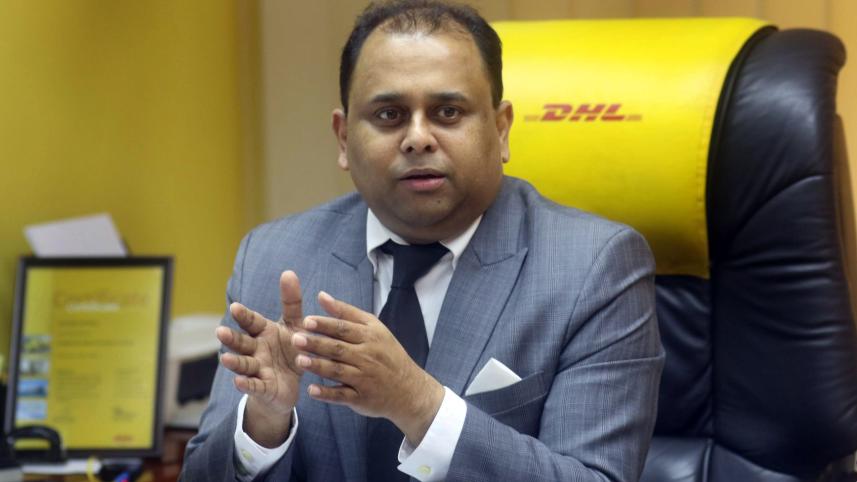DHL Global Forwarding banks on Bangladesh's potential

DHL Global Forwarding has great business potential with its capabilities, existing product portfolios and new business opportunities in Bangladesh, said Nooruddin Chowdhury, the company's country manager.
DHL Global Forwarding is a division of Deutsche Post DHL, providing air and ocean freight forwarding services. It is the global market leader in freight forwarding and logistics.
A business-to-business operation, DHL Global Forwarding stepped into the Bangladesh market in 2009. Before opening its full-fledged operations in Bangladesh, it had worked with agents for 22 years.
It provides international freight transportation, warehousing and distribution, customs, security and insurance along with green and industry sector solutions.
Bangladesh is a growing country and a lot of foreign investment is flowing into the country, said Chowdhury, who was appointed as country manager in February 2011.
A huge number of international buyers are doing business with Bangladesh, he said. They want similar services in Bangladesh, which they are used to receiving from DHL Global Forwarding in other countries, he added.
Chowdhury said a good number of industries are making headway in Bangladesh that will leave a positive impact on the overall economy.
DHL Global Forwarding has grown immensely over the years and received great support from its customers.
"We are doing very well in various industries such as life sciences and healthcare, garments, capital machineries, project cargo and consumer electronics."
He said the garment sector's supply chain is important in Bangladesh, and the company is particularly focused on innovation in the supply chain by introducing value-added services to help the industry grow.
The company has been continuously investing in people, assets, development of IT and value addition in Bangladesh.
"People are an important factor in whatever we do. It is part of our strategy as we want to be customers' first choice."
The company employs more than 120 people directly in Bangladesh, located largely in three locations: Dhaka, Chittagong and Hazrat Shahjalal International Airport in the capital.
There is a need for road freight development in Bangladesh for connectivity between the neighbouring countries such as India, Nepal and Bhutan.
The company serves customers in different sectors such as pharmaceuticals, home textiles, consumer products, including telecom and plastic industry that are also thriving.
DHL is the leader in offering cold chain solutions for temperature controlled pharmaceutical products.
In the first six months of the current fiscal year, foreign exchange earnings from locally made life sciences and healthcare sector have touched the Tk 300 crore mark, he said.
"It suggests that we have a role to play in putting our expertise in this sector," Chowdhury said, adding that the company has transported life-sciences products to Germany on behalf of a Bangladeshi pharmaceuticals company.
The government has also taken different steps to set up hundreds of special economic zones for the export-oriented companies, he said.
The company has a history of 200 years in freight forwarding business in the world. It has huge experience in international cargo movement, trade facilitation, trade consultation, and customs rules and regulations.
DHL was asked to do the trial shipment for road traffic movement between Bangladesh and India. "We did the trial shipment successfully with the help of the two governments."
The country trade will have to grow regionally too, instead of relying on long-haul goods movement, he said.
Chowdhury, who has been in the logistics and shipping industry for 26 years, said as a market leader, DHL's service quality is a benchmark for the industry.
Bangladesh's geographical linkage to countries like India, Nepal, Bhutan and even China opens up huge trading opportunities for the country, he said.
"We are confident that the economy in Bangladesh will grow on the back of the expanding export and import volumes of garments, pharmaceuticals, life sciences products and footwear."
The main challenge is attracting talent in the logistics industry. The fresh graduates may not have a clear idea about the logistics industry and proper education will help the talent pool to flourish, he said.
"Infrastructural development is necessary. The government is doing a lot of things, but more needs to be done. For example, our rules and procedures have to be made more investment-friendly."
Corporate taxes have to be aligned with rates in competitor countries or lowered if possible, so that more investment comes to Bangladesh, he said. "We need to make ourselves competitive."
DHL is also involved in corporate social responsibility activities. In Bangladesh, it is working for the betterment of education, health and safety in association with Teach for Bangladesh, Chowdhury said.
Teach for Bangladesh is a nationwide movement of university graduates and young professionals who are committed to expanding educational opportunity for all children in Bangladesh.
In many countries, including several in Asia, the company works as an authorised economic operator, taking responsibility of complete trade facilitation, he said.
"We maintain international standards and regulations, compliances and due diligence. There is little scope for irregularities," he said, adding that the company would also like to work as an authorised economic operator in Bangladesh.
"The benefit is huge: quick export and import cargo delivery. It also ensures revenue generation for the customs authorities."
Rules and regulations related to export and import should be upgraded to international standards, incentives for foreign investors should be widened and investment in different service sectors should be allowed, he said.
Chowdhury, 51, said manufacturers are doing many service-related tasks on their own, which do not allow them to concentrate completely on their core business.
"Exporters are more concerned about whether cargo reaches the port, loaded into the ships and shipments have been made," he said.
They could have spent this time designing and developing products by outsourcing to the service sector and ancillary tasks to logistics companies, Chowdhury said.
"If you can move faster than somebody else, you are the winner. This is also true in the competitive world markets."




 For all latest news, follow The Daily Star's Google News channel.
For all latest news, follow The Daily Star's Google News channel.
Comments